gatheringbones
63K posts
30’s backwoods dyke, white, best not to engage, block #currently reading
Don't wanna be here? Send us removal request.
Text
[The first organized political action by Vanguard was not, initially, a response to police brutality, but instead a response to discrimination by businesses against transsexuals and sex workers—but the results revealed to Vanguard members the symbiotic relationship between discrimination and police violence. In the mid-1960s, Compton’s Cafeteria was an all-night diner popular with the Tenderloin’s young transsexual and male prostitutes because the night manager was an older gay man who sympathized with queer street youth and allowed them to hang out at the café. When this night manager died, though, the diner hired a replacement who promptly began using private security guards to harass and remove the young drag queens and hustlers if they stayed too long or spent too little money. The youths were upset by this sudden hostile treatment in one of the few public spaces where they had been welcome, and began to discuss the issue at Vanguard meetings. The group decided to take action and organized a two-hour picket of Compton’s on July 18, 1966. In a letter home, Vanguard advisor Ed Hansen describes this initial protest:
Last Monday night and also Wed. night the Tenderloin (TL) kids of the organization called Vanguard picketed Compton’s restraunt [sic] on the corner of Taylor and Turk in the middle of the TL. We had between 30 and 50 pickets there each night from 10pm to midnight. We also got radio and TV coverage of our picket. Anytime you get young people—some of whom are pill-heads, prostitutes, or homosexuals picketing somewhere you are bound to get news coverage. The kids where [sic] protesting the unkind treatment they received from the management of Compton’s and also the harassment given them by the Pinkerton guard that Compton’s has working there.
There was no immediate result, but the picket seems to have consolidated the youths’ sense of collective injury. As illustrated in detail by Victor Silverman and Susan Stryker in their documentary film about the event, a month after this initial protest, when the management called the police to remove some transsexual youth, one cop made the mistake of manhandling an already angry queen. She threw her coffee in his face and a riot broke out. The other queens came to their friend’s defense, hitting cops in the face with heavy handbags (which were often deliberately weighted so they could be used as emergency weapons if a trick became violent during a date). The drag queens trashed the restaurant, smashed its plate glass windows and the windows of a police car outside, and set the corner newsstand on fire. Many Vanguard members were involved in the riot, and they organized a second protest the following night when Compton’s banned drag queens entirely. The second picket was attended by a wider range of community members and it, too, ended in the restaurant’s windows being smashed. The Compton’s riot marked the first violent, collective protest against harassment in the transgender/queer community."]
Jennifer Worley, from “Street Power” And The Claiming Of Public Space: San Francisco’s “Vanguard” and Pre-Stonewall Queer Radicalism, from Captive Genders: Trans Embodiment and the Prison Industrial Complex, edited by Eric A. Stanley and Nat Smith, AK Press, 2011
103 notes
·
View notes
Text
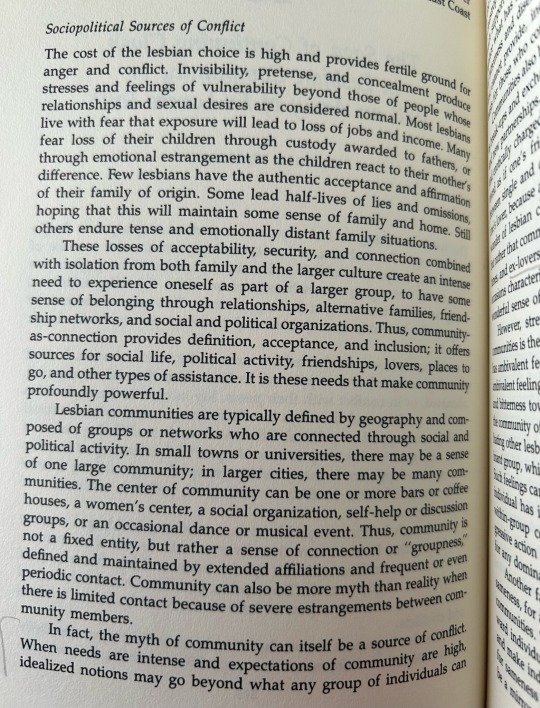
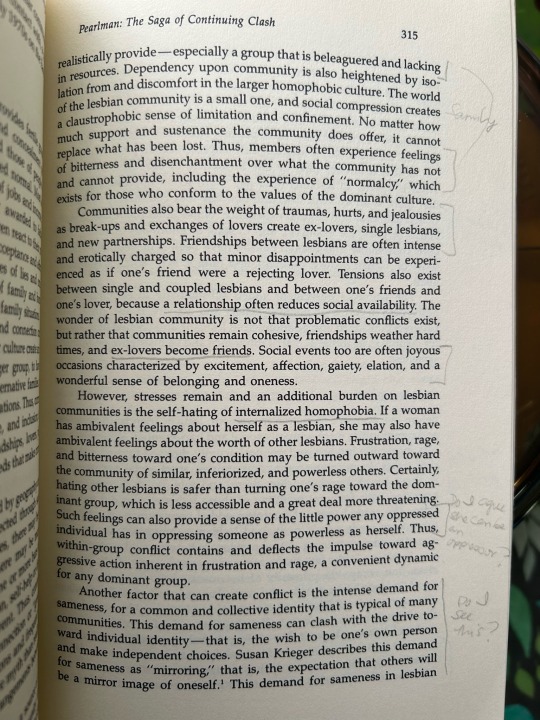
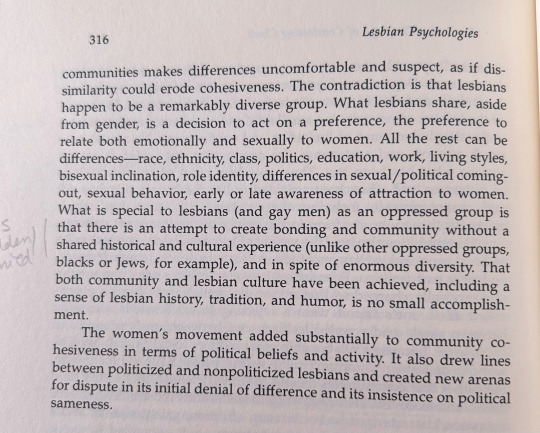
sarah f. pearlman, from the saga of continuing clash in lesbian community, or will an army of ex lovers fail? from lesbian psychologies: explorations and challenges, edited by the boston lesbian psychologies collective, 1987
106 notes
·
View notes
Text



minnie bruce pratt, from sinister wisdom issue 122: How Can A Woman Who Is With A Trans Man Call Herself A Lesbian? spring 2024
337 notes
·
View notes
Text
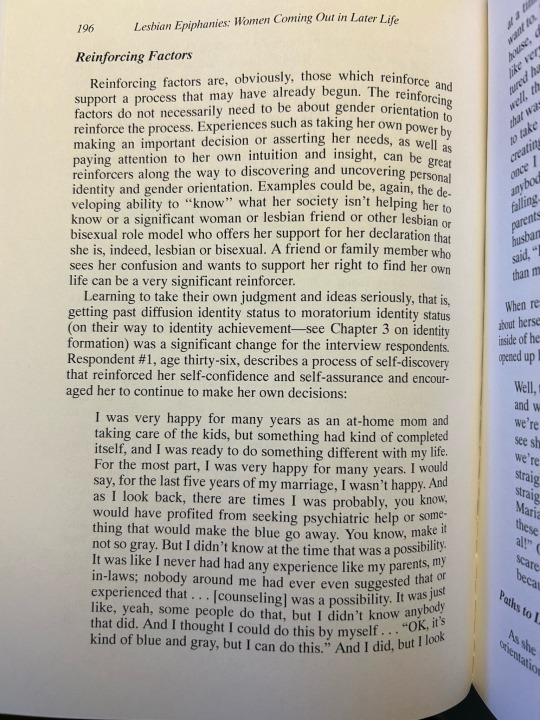
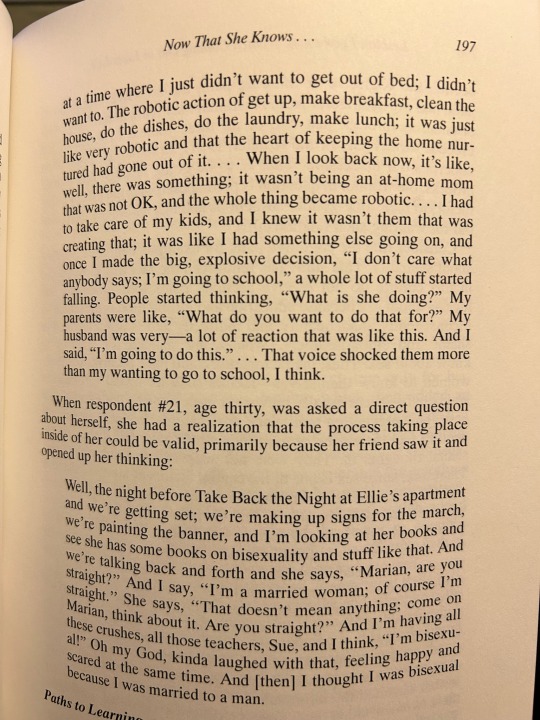
karol l. jensen, from lesbian epiphanies: women coming out in later life, 1999
25 notes
·
View notes
Text


More headpats for Franziska~
My FranMAYa Zine is still available for preorder until July 7th!
1K notes
·
View notes
Text
we need to go back to eating spaghetti the traditional way. no more of this fork and spoon nonsense
14K notes
·
View notes
Text

progress
started an experiment
72 notes
·
View notes
Note
how do you, effectively leave the scared parts at home, and at the same time give them enough space to make the weird gay art that they need to do in order for all of you to survive? i think i may have gotten it opposite, which means “force everyone to go to the dentist appointment while internally screaming and dissociating” and trying to right this ship lmao
years of work getting the gang to trust me and think that the things I suggest sound like good sense from someone who loves them by checking in on them frequently and giving them the ecosystem and structures they need to be the happiest and most interesting versions of themselves + years of therapy and psychoeducation.
29 notes
·
View notes
Text
there’s a song on the death stranding 2 soundtrack that makes me cry like a baby every time and it’s indigo by magnolian
1 note
·
View note
Text
it turns out a very scared very smart part was herding them all together like the world’s best sheepdog and getting us to make art instead of going to the dentist or looking at something something student loans file redacted in the black water with the sun shining at midnight those fruit shall come ripe and in the darkness of that which is golden shall split open to reveal the revelation of the fatal softness in the earth, which is technically great, I made so many fire horses to distribute in various parks and bus stops next spring, but at the same time I could be doing all of that and going to the dentist.
that ifs idea about letting your scared parts stay at home with the pets and the tv while your capable parts tackle the scary tasks has upended my whole world: c just helped me knock off three different things on my list that have been tormenting me for months
119 notes
·
View notes
Text
so many of my parts are just effervescent sensitive little stoners who want to grind their little hands to a nub making insanely overdetailed and yet still very slapdash art. they will take over and right the ship at a moment’s notice and crank out piece after piece after piece of art. you cannot ask these dear sweet lunatics to do paperwork. it’s cruel.
that ifs idea about letting your scared parts stay at home with the pets and the tv while your capable parts tackle the scary tasks has upended my whole world: c just helped me knock off three different things on my list that have been tormenting me for months
119 notes
·
View notes
Text
that ifs idea about letting your scared parts stay at home with the pets and the tv while your capable parts tackle the scary tasks has upended my whole world: c just helped me knock off three different things on my list that have been tormenting me for months
119 notes
·
View notes
Text
[“What frustrated reform was the absence of support, if not active dislike, for it by a hierarchy and Papacy whose personal fortunes were embedded in the existing system and who equated reform with Councils and the devolution of papal sovereignty. Throughout the century since the uprising of Hus, a religious revolution was in the making but the rulers of the Church failed to take notice. They regarded protest merely as dissent to be suppressed, not as a serious challenge to their validity.
Meanwhile a new faith, nationalism, and a new challenge in the rise of national churches were already undercutting Roman rule. Under the political pressure and deals made necessary by the Schism, the power of appointment, the essential source of papal power and revenue—which the Papacy had usurped from the local clergy, where it originally belonged—was gradually surrendered to the lay sovereigns or exercised at their dictation or in their interests. It had largely been lost already in France and England under forced arrangements with their rulers, and was to be further surrendered in this period to the Hapsburg Empire, Spain and other foreign potentates in the course of various political bargains.
To an unusual degree in the Renaissance good walked with evil in a wondrous development of the arts combined with political and moral degradation and vicious behavior. Discovery of classical antiquity with its focus on human capacity instead of on a ghostly Trinity was an exuberant experience that led to a passionate embrace of humanism, chiefly in Italy, where it was felt to be a return to ancient national glories. Its stress on earthly goods meant an abandonment of the Christian ideal of renunciation and its pride in the individual undermined submission to the word of God as conveyed by the Church. To the extent that they fell in love with pagan antiquity, Italians of the ruling class felt less reverence for Christianity, which, as Machiavelli wrote in The Discourses, makes the “supreme felicity to consist in humility, abnegation and contempt of things human,” whereas pagan religion found the chief good in “grandeur of the soul, strength of body and all the qualities that make men redoubtable.”
New economic enterprise, following the depression and miseries of the fading Middle Ages, accompanied humanism in the second half of the 15th century. Many explanations have been offered for this recovery: the invention of printing immensely extended the access to knowledge and ideas; advances in science enlarged understanding of the universe, and in applied science supplied new techniques; new methods of capitalist financing stimulated production; new techniques of navigation and shipbuilding enlarged trade and the geographical horizon; newly centralized power absorbed from the declining medieval communes was at the disposal of the monarchies and the growing nationalism of the past century gave it impetus; discovery of the New World and circumnavigation of the globe opened unlimited visions. Whether these were cause or coincidence or a turn of the tide in the mysterious ebb and flow of human affairs, they marked the beginnings of the period that historians call Early Modern.”]
barbara w. tuchman, from the march of folly: from troy to vietnam, 1984
7 notes
·
View notes
Text
[“In the search for meaning we must not forget that the gods (or God, for that matter) are a concept of the human mind; they are the creatures of man, not vice versa. They are needed and invented to give meaning and purpose to the puzzle that is life on earth, to explain strange and irregular phenomena of nature, haphazard events and, above all, irrational human conduct. They exist to bear the burden of all things that cannot be comprehended except by supernatural intervention or design.
This is especially true of the Greek pantheon, whose members are daily and intimately entangled with human beings and are susceptible to all the emotions of mortals if not to their limitations. What makes the gods so capricious and unprincipled is that in the Greek conception they are devoid of moral and ethical values—like a man lacking a shadow. Consequently, they have no compunction about maliciously deceiving mortals or causing them to violate oaths and commit other disloyal and disgraceful acts. Aphrodite’s magic caused Helen to elope with Paris, Athena tricked Hector into fighting Achilles. What is shameful or foolish in mortals is attributed by them to the influence of the gods. “To the gods I owe this woeful war,” laments Priam, forgetting that he could have removed the cause by sending Helen home at any time (presuming that she was there, as she very actively was in the Homeric cycle) or by yielding her when Menelaus and Odysseus came to demand her delivery.
The gods’ interference does not acquit man of folly; rather, it is man’s device for transferring the responsibility for folly. Homer understood this when he made Zeus complain in the opening section of the Odyssey how lamentable it was that men should blame the gods as the source of their troubles, “when it is through blindness of their own hearts” (or specifically their “greed and folly” in another translation) that sufferings “beyond that which is ordained” are brought upon them. This is a notable statement for, if the results are indeed worse than what fate had in store, it means that choice and free will were operating, not some implacable predestination.
As an example, Zeus cites the case of Aegisthus, who stole Agamemnon’s wife and murdered the King on his homecoming, “though he knew the ruin this would entail since we ourselves sent Hermes to warn him neither to kill the man nor to make love to his wife, for Orestes when he grew up was bound to avenge his father and desire his patrimony.” In short, though Aegisthus well knew what evils would result from his conduct, he proceeded nevertheless, and paid the price.
“Infatuation,” as Herodotus suggested, is what robs man of reason. The ancients knew it and the Greeks had a goddess for it. Named Atē, she was the daughter—and significantly in some genealogies, the eldest daughter—of Zeus. Her mother was Eris, or Discord, goddess of Strife (who in some versions is another identity of Atē). The daughter is the goddess, separately or together, of Infatuation, Mischief, Delusion and Blind Folly, rendering her victims “incapable of rational choice” and blind to distinctions of morality and expedience.”]
barbara w. tuchman, from the march of folly: from troy to vietnam, 1984
16 notes
·
View notes
Text
turns out they’re the greatest dogs who ever lived. all terrain cloth mother 😭

told c we can follow her heart and get the australian cattle dog of her dreams even though they are not cute
83 notes
·
View notes
Text
not sure why obsession with trains is seen as an autism thing when i think any reasonable human being with joy in their heart should be at least a little obsessed with trains. decently reliable public transport? with a rhytmic soothing motion but steady enough on long distances that you could read or draw while riding? getting to see the sights as you speed past? 10/10 best way to travel.
16K notes
·
View notes
Text
things that can be curried:
- vegetables
- function arguments
- favor
3K notes
·
View notes